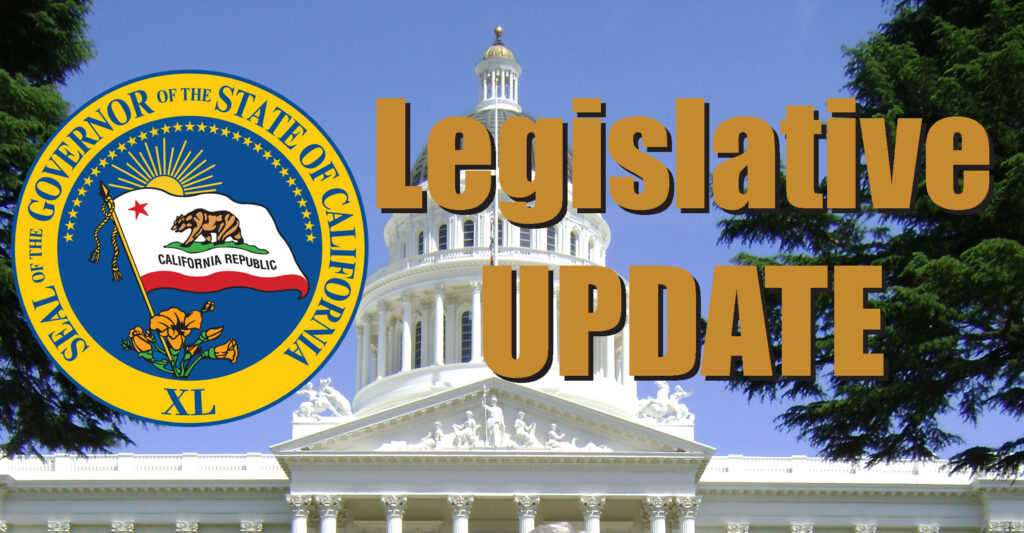CA legislature again attempts to limit speech on social media by fining platforms that “amplify” user-generated content

SB771 attempts to curb online “hate speech”, awaits Newsom’s decision by Oct. 12; second effort in two years to limit online speech, first one failed
Computer & Communications Industry Association warns California bill “could undermine free speech online”
“It effectively incentivizes broad suppression of speech through the threat of legal action.” – TechNet
“sets stage for…fight” and “could create a messy, drawn-out legal battle” – Washington Examiner
CalChamber also opposes
By Allen D. Payton
SB 771, by State Senator Henry Stern, entitled “Personal rights: liability: social media platforms” has passed both the State Assembly and Senate and currently awaits the governor’s decision as of September 22, 2025, would allow fines of up to $1 million per violation for social media companies that generate more than $100 million in annual gross revenues, whose algorithms amplify content violating California’s civil rights and anti-discrimination laws. (Source: compliancehub.wiki)
The platforms could also face fines of up to three months of the platform’s gross revenue preceding the judgment for intentional violations, or up to $500,000 per violation for reckless violations, which is designed to address platforms that show disregard for potential harm without specific intent.
Newsom has until Oct. 12, 2025, to either sign or veto the bill. If he signed, bill would become operative on January 1, 2027, giving social media platforms time to prepare.
According to the Legislative Counsel’s Digest, “Existing law generally regulates social media platforms, including by requiring a social media company to post terms of service for each social media platform owned or operated by the company in a manner reasonably designed to inform all users of the social media platform of the existence and contents of the terms of service, as prescribed.
Existing law generally prohibits a person from using violence or intimidation to interfere with another person’s enjoyment of certain rights or because of certain attributes of that person, including the person’s political affiliation, race, or sexual orientation, and punishes violations of that law with certain civil penalties or as misdemeanors, as prescribed.
This bill would make a social media platform, as defined, that violates the above-referenced provisions of law relating to personal rights through its algorithms that relay content to users or aids, abets, acts in concert, or conspires in violation of those laws, or is a joint tortfeasor in an action alleging a violation of those laws, liable for specified civil penalties. The bill would declare its provisions to be severable and would declare attempted waiver of its provisions to be void and unenforceable.”
The bill specifically references violations of:
- Penal Code Sections 31 and 422.6 (hate crimes and interference with civil rights)
- Civil Code Section 51.7 (Ralph Civil Rights Act)
- Civil Code Section 51.9 (Civil rights protections against violence or intimidation)
- Civil Code Section 52 and 52.1 (Tom Bane Civil Rights Act)
According to a report by Reason.com, “The Legislature says the bill is needed because of a rise in documented hate crimes. It cites a report by the Human Rights Campaign that found “anti-LGBTQ+ disinformation and harmful rhetoric” increased by 400 percent following the passage of Florida’s “Don’t Say Gay” bill in 2022, as well as a report by the Los Angeles County Commission on Human Relations that found that “hate crimes involving anti-immigrant slurs increased by 31 percent” in FY 2024, the highest number since tracking began in 2007.
“The bill additionally cites the Anti-Defamation League’s 2024 Audit of Antisemitic Incidents, which found an 893 percent increase in antisemitic incidents over the previous 10 years, and a 2023 study by nonprofit Global Witness, which found that paid advertisements promoting violence toward women were placed and distributed across social media platforms.”
However, the report continues, “the bill is sure to face scrutiny under Section 230 of the Communications Decency Act, which largely protects platforms from being held liable for user speech.”

Sets State for Free Speech Fight
According to a Washington Examiner report, the bill “sets stage for free speech fight” and “could create a messy, drawn-out legal battle with multibillion-dollar tech companies over what people can post on their platforms.”
CCIA Warns California SB 771 Could Undermine Free Speech Online
The Computer & Communications Industry Association (CCIA), whose members include Meta, the parent company of Facebook, Instagram, WhatsApp, Messenger and Threads; Google and Apple, is opposed to the bill. It testified in July “before the California Assembly Judiciary Committee…reiterating its opposition to SB 771. The association warns that the proposal could limit access to lawful content, discourage open dialogue online, and conflict with key constitutional and federal legal protections.
SB 771 would allow lawsuits against large social media platforms if their recommendation systems are accused of amplifying unlawful content targeting protected groups. But the bill’s broad language and legal uncertainty could force platforms to take down more content than necessary — not because it’s harmful, but to avoid the risk of litigation.
CCIA believes this approach would reduce the availability of protected speech and place platforms in a legally precarious position. The bill also raises serious concerns about First Amendment protections and may conflict with Section 230 of the Communications Decency Act, which shields online services from liability for content moderation carried out in good faith.
“We all want to create safer online spaces and are concerned that SB 771 takes the wrong approach,” said Aodhan Downey, State Policy Manager for CCIA. “The bill creates vague legal standards that could prompt platforms to over-remove content out of fear of lawsuits. That would limit access to important conversations and weaken free expression online. California lawmakers should reject this bill and pursue targeted, effective solutions that protect users while respecting constitutional rights.”
According to the company’s website, CCIA is an international, not-for-profit trade association representing a broad cross section of communications and technology firms. For more than 50 years, CCIA has promoted open markets, open systems, and open networks. CCIA members employ more than 1.6 million workers, invest more than $100 billion in research and development, and contribute trillions of dollars in productivity to the global economy.
TechNet, CalChamber Oppose SB771
In a July 10, 2025, letter to Assemblywoman Buffy Wicks, Chair of the Assembly Appropriations Committee, and who represents portions of Western Contra Costa County, TechNet, whose members include Comcast NBC Universal, Google and Meta, was joined by CCIA and the California Chamber of Commerce in writing, “TechNet and the following organizations must respectfully oppose SB 771, as it raises significant concerns about potential conflicts with longstanding internet law by exposing social media platforms to substantial liability, calculated in the billions, for user-generated content.
TechNet is the national, bipartisan network of technology CEOs and senior executives that promotes the growth of the innovation economy by advocating a targeted policy agenda at the federal and 50-state level. TechNet’s diverse membership includes dynamic American businesses ranging from startups to the most iconic companies on the planet and represents over 4.5 million employees and countless customers in the fields of information technology, artificial intelligence, e commerce, the sharing and gig economies, advanced energy, transportation, cybersecurity, venture capital, and finance.
Although SB 771 does not explicitly mandate content removal, it effectively incentivizes broad suppression of speech through the threat of legal action. In practice, the elevated liability risk could compel platforms to take down content based solely on unsubstantiated allegations of violence. This dynamic sets the stage for a heckler’s veto, in which bad actors or politically motivated users can flag content they disagree with, knowing the platform may err on the side of removal to avoid potential lawsuits.
This bill’s implicit concern is harmful content. It is impossible for companies to identify and remove every potentially harmful piece of content because there’s no clear consensus on what exactly constitutes harmful content, apart from clearly illicit content. Determining what is harmful is highly subjective and varies from person to person, making it impossible to make such judgments on behalf of millions of users. Faced with this impossible task and the liability imposed by this bill, some platforms may decide to aggressively over restrict content that could be considered harmful.
Furthermore, platforms would need to evaluate whether to eliminate their fundamental features and functions, which are the reasons users go to their platforms, due to the legal risk involved. For instance, direct messaging features could potentially be misused for contacting and bullying other teens; such features would likely be removed.
Serious First Amendment concerns.
It is well established that the companies covered by this legislation have constitutional rights related to content moderation, including the right to curate, prioritize, and remove content in accordance with their terms of service. By exposing these companies to civil liability for content they do not remove, SB 771 creates a chilling effect on their editorial discretion. The significant, prescribed civil penalties – potentially amounting into the billions for each violation – would lead platforms to over-remove lawful content to mitigate legal exposure. Therefore, if this law passes, it will almost certainly be struck down in court (see NetChoice v Paxton) because it imposes liability on social media platforms for whether certain types of third-party content are shown to users, as well as the expressive choices social media platforms make in designing the user experience. This violates the First Amendment rights of users and social media platforms.
Moreover, the proposed liability framework likely conflicts with Section 230 of the Communications Decency Act, which provides strong federal protections for platforms against civil liability for third-party content and for good-faith content moderation. Courts (see Twitter,inc V. Taamneh, 598 U.S.__ (2023)) have consistently upheld Section 230 as preempting state-level attempts to impose liability for content hosting or moderation decisions.
For these reasons, we respectfully oppose SB 771. If you have any questions regarding our position, please contact Robert Boykin at rboykin@technet.org or 408.898.7145.”
The letter was signed by Robert Boykin, Executive Director for California and the Southwest TechNet, Ronak Daylami attorney and Policy Advocate with the California Chamber of Commerce and Aodhan Downey of the CCIA.
Second Legislative Attempt to Limit Online Speech, First Failed in Court
This is the second attempt by the California legislature and Newsom to limit online speech in the last two years. Last year, AB2839 and AB2655 were signed into law, banning deceptive elections-related media, known as “deep-fakes”, in advertisements including those containing parody.
AB2839 would have “prohibited a person, committee, or other entity from knowingly distributing an advertisement or other election communication, as defined, that contains certain materially deceptive content, as defined, with malice, as defined, subject to specified exemptions. The bill would apply this prohibition within 120 days of an election in California and, in specified cases, 60 days after an election.”
AB2655 would have required “a large online platform, as defined, to block the posting of materially deceptive content related to elections in California, during specified periods before and after an election…and to label certain additional content inauthentic, fake, or false.”
However, parody website, The Babylon Bee sued the state and according to the Alliance Defending Freedom which represented the media outlet, “California officials agreed they cannot enforce one of those laws (AB2839) against The Babylon Bee and Kelly Chang Rickert, a California attorney and blogger, after a federal district court ruled that the law likely violates the First Amendment.”
Contact Governor Newsom
To contact the governor’s office to offer your opinion on the legislation, use the website form at www.gov.ca.gov/contact and select Legislation Issues/Concerns in the drop down menu, mail Governor Gavin Newsom at 1021 O Street, Suite 9000 Sacramento, CA 95814 or call (916) 445-2841.
the attachments to this post:

Legislative Update CA State Capitol Newsom

























